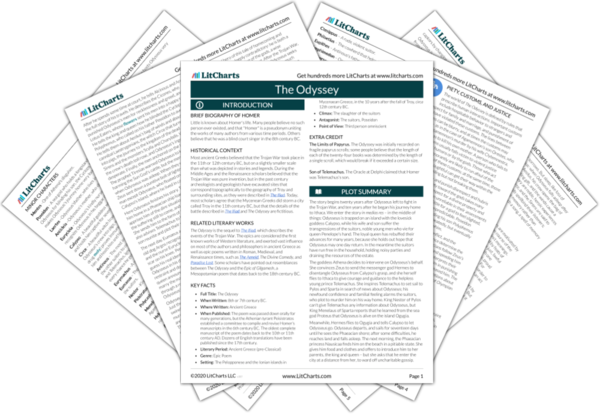Summary
Analysis
When Telemachus arrives at the farm, Eumaeus asks him to take care of the stranger. Telemachus gladly offers to give the stranger clothes and a sword. Odysseus-the-beggar interjects to say that it upsets him to hear about the sad state of affairs at the palace, and that he wishes he could help fight the suitors; if he were Odysseus, he says, he would deserve death if he did not fight his offenders, and he would gladly die trying to fight them rather than tolerate their insulting behavior. Telemachus asks Eumaeus to go to the palace and tell Penelope that her son has returned home safely, but to tell no one else, not even Laertes.
Telemachus proves his hospitality when he offers to help the stranger. It seems that hospitality is not only a custom, in this world, but a cardinal virtue: a quality, like integrity or kindness, that implies most other human merits. Odysseus spells out the requirements of honor for Telemachus and Eumaeus: they must defeat the suitors or die.
Themes
Athena approaches the farm, but only Odysseus and the dogs can see her. He walks outside to talk to her, and she tells Odysseus to reveal his true identity to Telemachus so that the two can plan their revenge against the suitors. She makes Odysseus look like himself again. When he steps back inside, Telemachus is amazed at the transformation – he thinks Odysseus must be a god, since only gods can change so easily. I am your father, Odysseus tells him; Telemachus can't quite believe it at first, but Odysseus explains that Athena is responsible for his magical transformation.
Athena helps Odysseus carry out his vengeance by helping him conceal and reveal his identity: she enhances his talent for disguise by intermittently changing his appearance. We see again that she helps Odysseus, she augments his own skills, but she does not control him. And note how the capacity for transformation and disguise is seen as a godlike quality.
Themes
Odysseus asks Telemachus to describe the suitors so that they can plan an attack. Telemachus doubts that only two men can defeat such a large group of suitors – over a hundred in total – but Odysseus reminds him that Athena and Zeus will stand by them as well. Odysseus tells him to go to the palace and mingle with the crowd of suitors. Eumaeus will bring Odysseus, once again disguised as a beggar, into town later. Odysseus further instructs Telemachus to keep his return secret – even from Laertes, Penelope, and Eumaeus.
Athena has assured Odysseus that he can trust Telemachus, but he does not trust any other member of his family with the news of his return. His suspicion is not unkind: in a world where people's lives and loyalties change constantly (just ask Agamemnon), it would be foolish of Odysseus to expect his family to stay exactly as it was for the twenty years of his absence.
Themes
Both Eumaeus and a herald from Pylos report to Penelope that Telemachus has come home. The suitors are dismayed to hear the news. They gather at the meeting grounds and complain that a god must have saved Telemachus's life. Antinous proposes to murder him on home soil, but in secret, to avoid persecution. Amphinomus suggests that they should only kill the prince if the gods are in favor of the murder, and the suitors all agree to this more moderate plan.
The suitors are both impious and foolish to try to harm a person who seems to have the protection of the gods. It is disrespectful and futile to pit one's will against the will of the gods. Mortals can act freely, in this world, only if they do not interfere with the plans of the gods: they are free the way cattle are free to roam in a very large pen.
Themes
Get the entire The Odyssey LitChart as a printable PDF.

Penelope emerges from her chambers and confronts Antinous about his schemes against Telemachus. She reminds him that Odysseus once saved his father, and shames Antinous for mistreating Odysseus's land and wife in his absence. Eurymachus tells Penelope that he will not let Telemachus be harmed, but his reassurance is dishonest. Meanwhile, Eumaeus returns to the farm, and he, Telemachus, and Odysseus (once again disguised as the beggar) eat and fall asleep.
Slowly, the suitors begin to acquire distinct personalities. Antinous is impious and violent; his behavior seems all the more heinous when we learn that he owes Odysseus a debt of honor for saving his father. Unlike the other suitors, he has no consideration of honor and piety – he is almost as lawless as Polyphemus.
Themes












